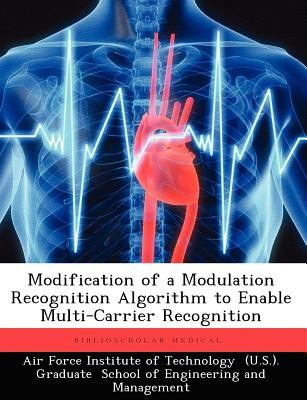
- We will send in 10–14 business days.
- Publisher: BiblioScholar
- ISBN-10: 1249397901
- ISBN-13: 9781249397908
- Format: 18.9 x 24.6 x 0.4 cm, softcover
- Language: English
- SAVE -10% with code: EXTRA
Modification of a Modulation Recognition Algorithm to Enable Multi-Carrier Recognition (e-book) (used book) | bookbook.eu
Reviews
Description
Modulation recognition is important for both military and commercial communication applications, particularly in cases where enhanced situation awareness and/or channel assessment is required to mitigate intentional or collateral interference. Modulation recognition via statistical analysis is a key aspect of non-cooperative signal interception, classification, and exploitation. This research concerns the evaluation and modification of a conventional Digitally Modulated Signal Recognition Algorithm (DMRA) to enable multi-carrier, OFDM, waveform recognition. The original DMRA architecture was developed to classify communication signals for three fundamental data modulations, i.e., ASK, PSK, and FSK. By adding an additional key feature and threshold to the original DMRA architecture, a modified DMRA architecture is developed to enable the reliable recognition of OFDM waveforms. Simulation results for the modified DMRA architecture show a 95.25% success rate for OFDM waveform recognition at a signal-to-noise ratio (SNR) of 11:0 dB. When operated under scenarios where FSK signals are neither present nor considered an alternative, the modified DMRA architecture yields a success rate of 98.25% for classifying OFDM at a SNR of 5:0 dB.
EXTRA 10 % discount with code: EXTRA
The promotion ends in 15d.08:02:02
The discount code is valid when purchasing from 10 €. Discounts do not stack.
- Publisher: BiblioScholar
- ISBN-10: 1249397901
- ISBN-13: 9781249397908
- Format: 18.9 x 24.6 x 0.4 cm, softcover
- Language: English English
Modulation recognition is important for both military and commercial communication applications, particularly in cases where enhanced situation awareness and/or channel assessment is required to mitigate intentional or collateral interference. Modulation recognition via statistical analysis is a key aspect of non-cooperative signal interception, classification, and exploitation. This research concerns the evaluation and modification of a conventional Digitally Modulated Signal Recognition Algorithm (DMRA) to enable multi-carrier, OFDM, waveform recognition. The original DMRA architecture was developed to classify communication signals for three fundamental data modulations, i.e., ASK, PSK, and FSK. By adding an additional key feature and threshold to the original DMRA architecture, a modified DMRA architecture is developed to enable the reliable recognition of OFDM waveforms. Simulation results for the modified DMRA architecture show a 95.25% success rate for OFDM waveform recognition at a signal-to-noise ratio (SNR) of 11:0 dB. When operated under scenarios where FSK signals are neither present nor considered an alternative, the modified DMRA architecture yields a success rate of 98.25% for classifying OFDM at a SNR of 5:0 dB.


Reviews